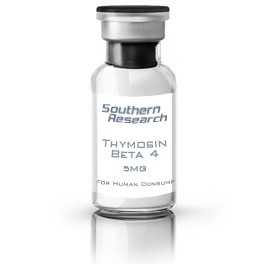What is Known and Unknown about Thymosin Beta 4 (TB500)
Thymosin Beta 4 (TB500), also occasionally referred to as Tβ4, is a polypeptide chain that has a molecular formula of C12H35N56O78S, and a molecular weight of 4963.4408. Its structure is built from 43 amino acids. Currently, it is solely designated for scientific study based on animal test subjects.
Scientific study based on animal test subjects has determined that the primary function of Thymosin Beta 4 (TB500) is to control actin; the globular protein that plays a vital part in a host of cellular processes ranging from cytokenesis and cell signaling to cellular division and muscle contraction. The peptide has been able to show an affinity toward actin protein, which then creates a sequestering molecule within eukaryotic cellular units that block the process of reacting monomer molecules along with a chemical reaction to form polymer chains.
Further scientific study based on animal test subjects has also determined that Thymosin Beta 4 (TB500)’s engagement with actin ends up promoting cytoskeleton cell migration. The first way the peptide promotes the process is through the formation and maintenance of blood vessels; a process that is known as endothelial migration. A second way that Thymosin Beta 4 (TB500) accomplishes this function is by way of a process called keratinocyte migration; a process in which an epidermal barrier is formed in order to safeguard against various environmental agitators, including:
UV radiation
Water loss
Heat
Various pathogens
These dual processes in essence enable Thymosin Beta 4 (TB500) the ability to promote the formation and growth of blood vessels, which in turn enables a more efficient means of cellular migration. These processes also tie the peptide to a heightened level of anti-inflammatory properties. Scientific study based on animal test subjects has determined that Thymosin Beta 4 (TB500)’s low molecular weight plays a key role in allowing it to travel through long distances throughout the body via tissues as a means to accomplish its functionality. Additionally, it has been determined that Thymosin Beta 4 (TB500) is present in wound fluid. It has also been determined that the peptide does possess natural wound healing properties.
What These Processes Mean
According to scientific study based on animal test subjects, it has been determined that Thymosin Beta 4 (TB500)’s overall functionality enables it to have a host of positive properties.
For instance, it has been determined that Thymosin Beta 4 (TB500) has the ability to boost muscular tissue. This is due to its elevated faculty to grow and transport cells via boosted cellular migration, which is thought to boost skeletal and muscular tissue growth more efficiently. This elevated process seems to indicate that the peptide may contain anabolic tendencies, although it should be reiterated that this determination has currently not made one way or the other.
The peptide’s natural wound healing properties and ability to promote an escalated level of anti-inflammation has allowed scientific study based on animal test subjects to determine that Thymosin Beta 4 (TB500) can play a vital role in boosting wound repair. It is also thought to be able to promote an elevated level of injury recovery because of its ability to promote a more efficient rate of cellular generation.
Additionally, scientific study based on animal test subjects has determined that Thymosin Beta 4 (TB500) can cause a boosted rate of flexibility. This is largely due to the peptide’s faculty to boost levels of anti-inflammation, which in turn enables an animal test subject to experience a wider scope of stretching without experiencing fatigue or damage.
Further scientific study based on animal test subjects has also determined that Thymosin Beta 4 (TB500) could also play a vital role in cell differentiation in blood vessel, collage deposition, and angiogenesis (that is, the process in which the growth of new blood cells can be formed from older blood vessels).
Research Disclaimer
Thymosin Beta 4 (TB500) is only intended for the sole use of scientific study at this time. All of the research and findings that have been determined and discussed are completely built around the scientific study on animal test subjects. Because of this, any findings or observations that can be tied to Thymosin Beta 4 (TB500) should exclusively be contained to a laboratory, a medical research facility, or another strictly controlled environment in this vein.
|




 Bestropin
Bestropin


